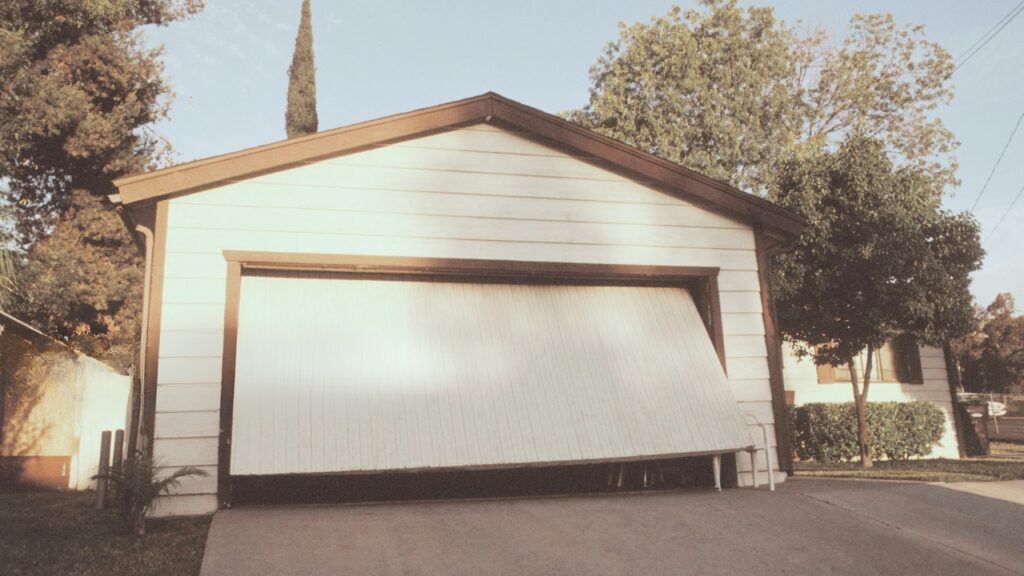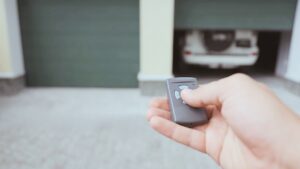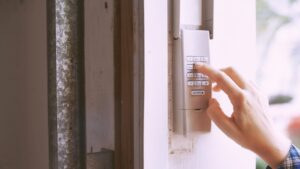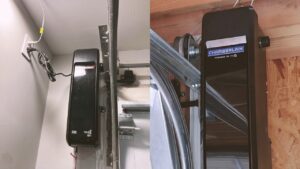Connect With A Garage Expert
Connect with local experts, Compare quotes, Get the best price.
Has your garage door ever started opening and closing spontaneously on its own? You walk towards your car to grab something and hear the loud sounds of the garage door mechanism activating randomly. A garage door that opens and closes by itself is not only frustrating but can feel unsafe.
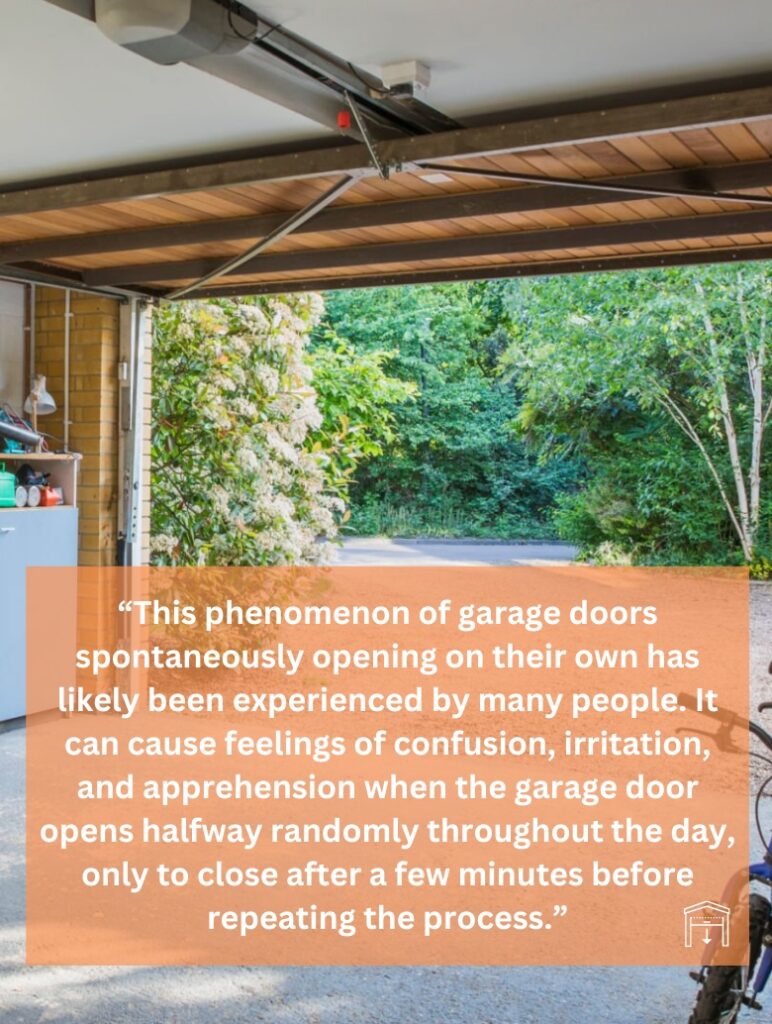
This phenomenon of garage doors spontaneously opening on their own has likely been experienced by many people. It can cause feelings of confusion, irritation, and apprehension when the garage door opens halfway randomly throughout the day, only to close after a few minutes before repeating the process.
This article outlines five solutions that typically rectify the issue of garage doors opening unexpectedly on their own before the situation escalates or causes too much concern.
Why Your Garage Door Opens and Closes By Itself
A garage door that activates randomly can be caused by issues with the opener system or environmental factors triggering motion detectors. Identifying the specific cause allows proper repairs to prevent disruptive self-activations.
Here are some of the reasons why that happens and how to fix it.
1. Faulty Circuit Board
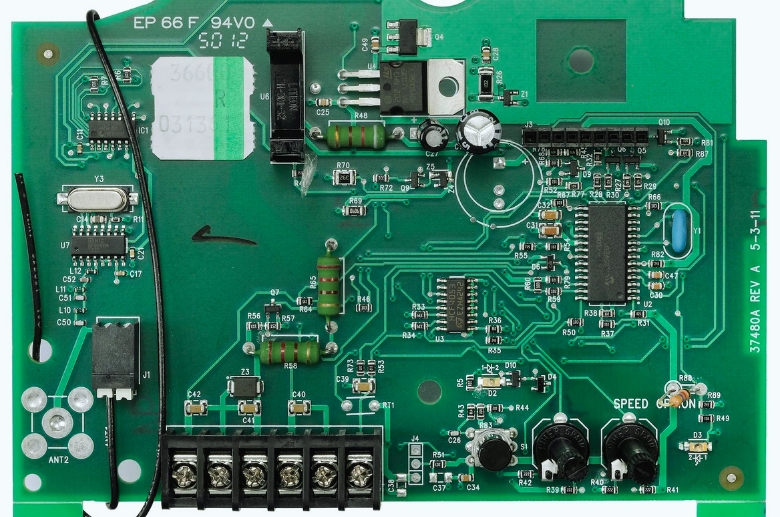
The main control board in a garage door opener acts as the central processor directing all functions. Faulty circuit boards with deteriorated components or damaged wiring connections can erroneously trigger the motor without prompt input, leading to spontaneous activations.
Replacing aging circuit boards restores the proper tolerance of electronics and insulation needed to filter natural signal noise vs. legitimate commands. This grants predictable operation rather than a gradual erratic performance from failing control boards. Investing in proactive circuit board replacements avoids compounding glitch issues over time.
2. Electrical Wiring Problems
Exposed or damaged sensor wiring can inadvertently create short circuits, emitting signals that the garage door opener’s system might detect as commands. This results in the door opening or closing without any direct user command.
Wiring issues, especially those caused by environmental damage like rodent activity or natural wear, can lead to electrical interference that disrupts the sensors’ normal operation.
You can prevent these unintended signals by ensuring that sensor wiring and nearby electrical cables are properly insulated and protected from damage. Regular checks for damage and appropriate shielding of the sensor wiring are essential to maintaining the system’s integrity and preventing electrical noise from interfering with the garage door opener’s functionality.
3. Damaged Remote/Buttons
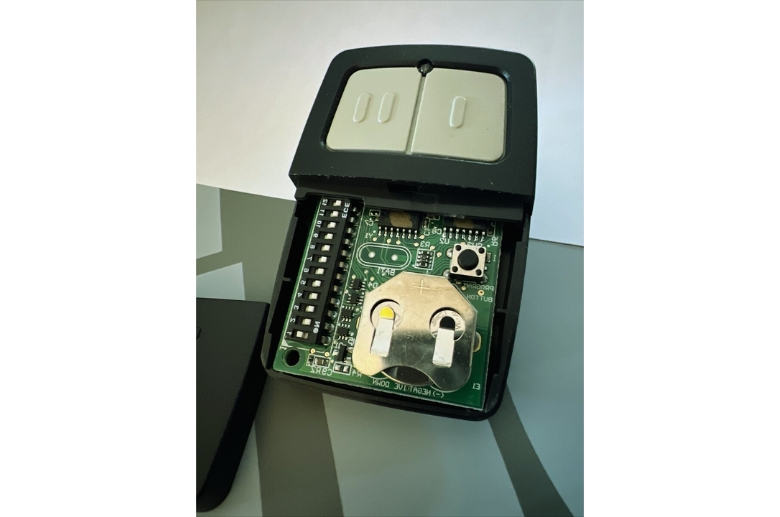
A stuck garage door remote button or internal component damage can lead to the automatic and repetitive transmission of open/close signals. When the switch becomes lodged or the internal components are compromised, the garage door can be continuously activated.
To address this problem, inspect the remote or wall control buttons for any visible damage or debris. Clean the buttons carefully, ensuring that there are no obstructions. If the issue persists, consider replacing the remote battery, as a weak or faulty battery can contribute to irregular signal transmission.
4. Possibility of Being Hacked
Garage door openers with wireless capabilities can sometimes become targets for hackers. These individuals might manipulate the opener’s functionality, causing it to open and close unexpectedly, either as a form of mischief or as part of more disruptive activities.
In more concerning scenarios, hackers could exploit weak security in IoT-enabled garage door controllers to gain unauthorized access to broader home networks.
To mitigate the risk of such cyber threats, implementing fundamental security measures is crucial:
- Change Default Passwords: Replace any factory-set passwords with strong, unique alternatives to enhance security. Change default network passwords that came from the factory.
- Monitor Access Logs: Regularly review your opener’s access logs for any suspicious activity that indicates potential unauthorized access.
- Keep Software Up to Date: Ensure that your opener’s software, firmware, and associated applications are always updated to the latest versions, which often include security enhancements.
- Limit Connectivity: Consider disabling your opener’s wireless connection during extended periods away from home, like vacations, to reduce the risk of unauthorized access.
5. Worn-Out Opener
Over time, garage door openers degrade due to wear and tear on the mechanical and electrical components. This can cause issues such as sticking switches, binding gears, and degraded circuit boards. As a result, older openers are prone to randomly activating open/close cycles, making troubleshooting a challenge as new symptoms frequently arise.
Replace old garage door openers with modern systems for reliability. Upgrading to a contemporary model with solid-state electronics, encrypted signals, and heavier movement mounts ensures a more efficient and cost-effective long-term solution.
6. Limit Setting Problems
If the UP or DOWN limits are set inaccurately, it can cause problems with the door’s cycle. For example, if the DOWN limit is set too high, the door will hit the ground and auto-reverse before closing fully.
Fixing this requires carefully consulting the opener manual to identify the limit adjustment dials/screws. Minor tweaks to the settings are needed to allow a complete door cycle without premature auto-stopping or reversing. Adjusting both UP and DOWN limits according to manufacturer specifications results in smooth operation from fully open to fully closed.
7. Blocked or malfunctioning safety sensors
Safety sensors prevent door closings if obstructions are detected. However, accumulations of dirt/debris or falls/damage can block the safety eye beam. This fools the system into detecting phantom obstructions, causing erratic reversals and openings.
Cleaning sensor lenses with glass cleaner removes built-up film. Realigning lenses to point directly across at each other also helps beam transmission. Checking for sensor damage like cracks allows full infrared propagation. Ensuring lenses are clean and functional prevents false obstruction detection, resulting in smoother door operation.
8. Impact of Environmental Conditions
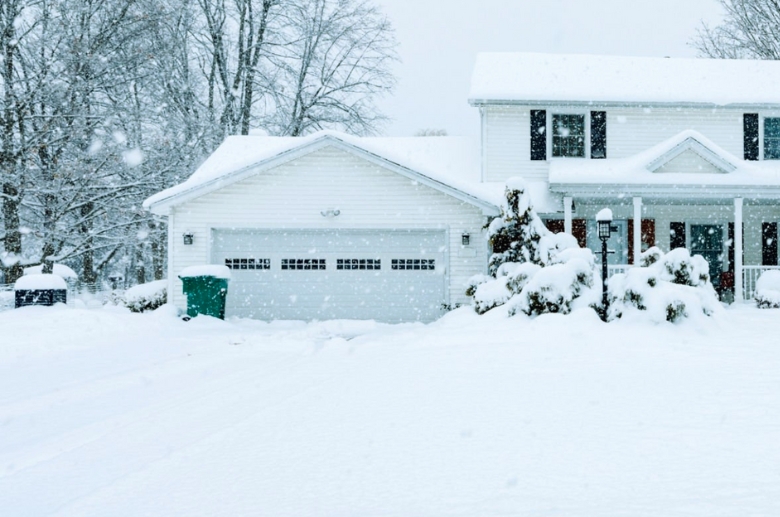
Environmental elements, such as high humidity or seasonal changes in moisture, can adversely affect garage door mechanisms. In particular, wooden doors may absorb moisture and expand, leading to misalignment or distortion.
Similarly, moisture exposure can cause corrosion in metal parts of the garage system, including springs, rollers, tracks and circuit boards, resulting in rust accumulation that impedes smooth operation or leads to electrical malfunctions.
To address these challenges, proactive measures such as replacing deteriorated parts, recalibrating component tolerances, and applying appropriate lubrication are essential. These steps can significantly mitigate the wear and tear inflicted by harsh environmental conditions, ensuring the longevity and reliability of the garage door opener.
Connect With A Garage Expert
Connect with local experts, Compare quotes, Get the best price.
9. Software Glitches And Connectivity Issues
Smart garage doors, which rely on app and WiFi connections for operation, can sometimes encounter software glitches or connectivity issues that inadvertently trigger the opener’s functions. To address these challenges, several troubleshooting steps can be effective:
- Resolve App Hang-ups: If an app controlling the garage door becomes unresponsive, force close it to terminate any stuck processes.
- Reboot the Opener: Restarting the garage door opener’s controller can help refresh its connection and clear temporary software glitches.
- Update Firmware and Software: Regularly install updates for both the opener’s firmware and the controlling app to ensure compatibility and bug fixes.
- Reset WiFi Settings: Adjusting the WiFi settings, such as reconnecting or refreshing the connection, can resolve connectivity problems that may cause erratic opener behavior.
Furthermore, enhancing the system’s network environment can improve performance:
- Improve Router Signal: Verify that the signal strength at the garage door opener’s location is strong and stable, avoiding weak zones.
- Check Network Configuration: Ensure the opener is connected to the main network and not a guest network, which may have restricted access.
- Optimize Opener Placement: If possible, temporarily move the opener closer to the router during troubleshooting to eliminate the possibility of signal interruptions due to distance or obstructions.
These steps can significantly reduce the incidence of software-related issues, ensuring the smooth and reliable operation of smart garage door systems.
10. Frequency Interference
Garage door openers rely on radio frequency (RF) signals to communicate commands from the remote or wall panel to the motor unit. Early model openers operated on a single universal frequency prone to interference from other devices using the same frequency. So, Neighbors’ using similar transmitters could inadvertently open someone else’s door.
If your tests confirm that your garage door unintentionally opens when your neighbor uses their remote, you will need to adjust the frequency and reprogram your system.
The easiest solution is to switch your system to a unique frequency by adjusting the dip switches or pressing designated buttons on the motor unit, followed by reprogramming your remote controls to match, ensuring secure and interference-free operation.
This step will avoid any further conflicts, given the availability of multiple frequency combinations, to ensure your garage door opener operates on a distinct signal.
Can Garage Door Openers Be Hacked?
Yes, particularly older models with fixed codes are susceptible to hacking through methods like brute force attacks or the use of code grabbers, which can compromise garage door security.
However, the vulnerability to hacking has significantly diminished with the advent of modern garage door openers that utilize rolling code technology. This technology provides billions of secure code combinations that change after every use, making it much harder for unauthorized person to gain access to your garage.
To further reduce the risk of hacking, it’s crucial to practice good security habits, such as installing deadbolts on garage doors, reinforcing connecting doors to living spaces with sturdy materials, setting up security cameras to deter potential intruders, and activating vacation mode on your garage door system when away for extended periods.
Despite these advanced precautions, fundamental practices like not leaving remote controls in visible locations and ensuring the garage door is always closed when not actively in use form the cornerstone of effective garage security.
Final Thoughts
When facing the issue of your garage door opens and closes by Itself there are effective solutions to consider, including checking the sensors and remote controls or fine-tuning the opener’s limits. It’s critical to prioritize safety during these repairs by cutting off the power supply and donning protective gear, especially when dealing with electrical components, to avoid the hazards of exposed wiring.
Trust your instincts if something doesn’t seem right. Ensure you have an emergency plan in place, whether it’s to call for help or to evacuate safely from the garage.
Ready to stop your garage door from mysteriously opening and closing on its own? Contact us now and get a free consultation!

